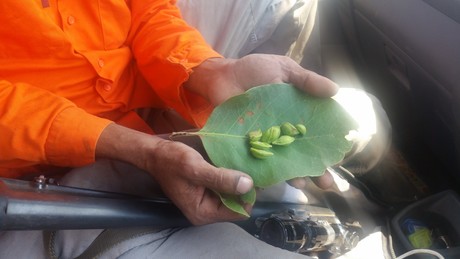Agribusiness partnership to explore native medicinal plants

A newly formed research and commercial partnership aims to explore the development of a sustainable agribusiness model for traditional medicinal plants growing in northern Australia, bringing together extensive research and industry experience to focus on traditional Australian medicinal plants as an important biological, cultural and economic resource.
The 18-month project is a partnership between the Darwin-based Menzies School of Health Research, Traditional Homeland Enterprises (T.H.E.), Integria Healthcare and The University of Queensland (UQ), and has received $363,363 in funding from the Cooperative Research Centre for Developing Northern Australia (CRCNA). Project participants have additionally committed $188,845 in cash and $461,074 in-kind contributions towards the project.
The project originated from requests by a Menzies Indigenous Reference Group (IRG) seeking that more research be done on Indigenous medicinal plants. According to Mark Mayo, the partnership’s Indigenous Steering Committee representative and Menzies researcher, the group initiated plans for this project with a view to creating important opportunities for collaboration and mutual learning through the application of modern science to Indigenous knowledge.
“This exciting project will provide opportunities for Aboriginal people to share their knowledge of medicinal plants, developed over thousands of years, with researchers that have expertise in laboratory testing and healthcare product development,” Mayo said.
“The project also offers employment and training for Indigenous people, as well as the possibility of developing a sustainable agribusiness for future employment and training in Indigenous communities.”
The project’s long-term goal is the development of a local industry with opportunities in Indigenous workforce development, sustainable regional development in northern Australia and potential export of uniquely Australian, value-added products.
CRCNA CEO Jed Matz said the project is a significant investment in traditional owner-led business models and will provide far-reaching benefits to the communities involved, with early estimations that the products delivered could add an additional $20 million in value to the bush medicine sector over the next 5–10 years.
“An important element of this project will be the extensive consultation and engagement with traditional land owners and partners to ensure the project will deliver sustainable economic benefits to the community and provide a pathway to a successful business model,” he said.
Traditional medicinal plants will be evaluated at Menzies and UQ, with a view to using these findings to develop prototype healthcare products. For example, Integria Healthcare will build on 60 years of expertise in traditional herbal medicines and experience gained from its early involvement with Australian tea tree oil to lead the development of prototype healthcare products.
“Once the early-stage research is completed, Integria will use the findings to further the development of prototype products in collaboration with the Indigenous communities,” said Integria CEO John Kavanagh. “Integria looks forward to playing a role in the development of Australia’s own traditional medicinal plants.”

T.H.E. Executive Officer Ann Shanley said the enterprise looks forward to bringing its experience in the Kakadu plum industry to collaborate with Top End communities in developing models for sustainable Indigenous-led agribusinesses.
“This is an exciting opportunity to bring together learnings as we look to continue developing meaningful economic opportunities for Indigenous communities and explore solutions to important challenges such as supply chain, benefit sharing and intellectual property management,” Shanley said.
The initial phase of the project also includes opportunities for young Indigenous scientists, with two Indigenous trainees already working on the project at the Menzies laboratories. In addition to laboratory work, there are opportunities to explore and preserve Indigenous knowledge of traditional medicinal plants and their use.
“Participating in such an enterprise requires a range of skills and the project expects to expand the involvement of Indigenous trainees across several disciplines and create further opportunities to include students at either Certificate or Undergraduate level,” said Menzies Honorary Fellow Dr Greg Leach. “We are also currently seeking an Indigenous postgraduate student.”
Breakthrough blood test for endometriosis developed
Scientists identified 10 protein biomarkers, or 'fingerprints' in the blood, that can be...
A simple finger prick can be used to diagnose Alzheimer's
A new study is paving the way for a more accessible method of Alzheimer's testing, requiring...
Experimental blood test detects early-stage pancreatic cancer
The new test works by detecting two sugars — CA199.STRA and CA19-9 — that are...




